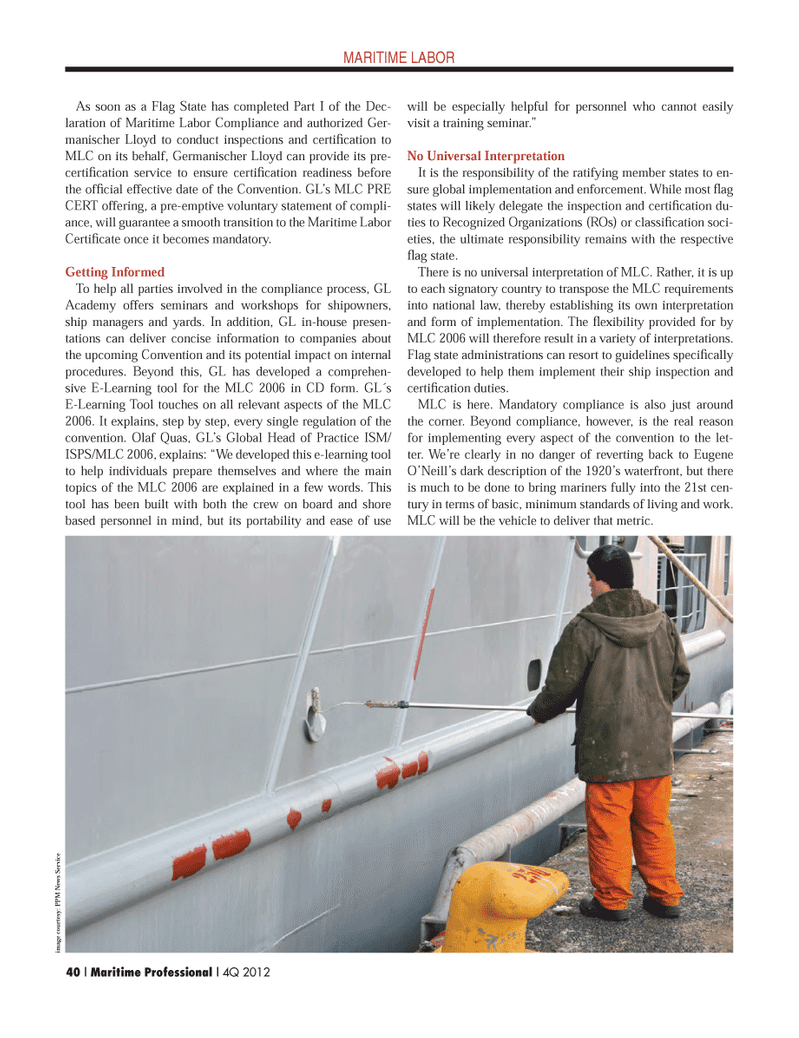
Page 40: of Maritime Logistics Professional Magazine (Q4 2012)
The Environment: Stewardship & Compliance
Read this page in Pdf, Flash or Html5 edition of Q4 2012 Maritime Logistics Professional Magazine
40 | Maritime Professional | 4Q 2012MARITIME LABORAs soon as a Flag State has completed Part I of the Dec- laration of Maritime Labor Compliance and authorized Ger- manischer Lloyd to conduct inspections and certiÞ cation to MLC on its behalf, Germanischer Lloyd can provide its pre- certiÞ cation service to ensure certiÞ cation readiness before the ofÞ cial effective date of the Convention. GLÕs MLC PRE CERT offering, a pre-emptive voluntary statement of compli- ance, will guarantee a smooth transition to the Maritime Labor CertiÞ cate once it becomes mandatory. Getting Informed To help all parties involved in the compliance process, GL Academy offers seminars and workshops for shipowners, ship managers and yards. In addition, GL in-house presen-tations can deliver concise information to companies about the upcoming Convention and its potential impact on internal procedures. Beyond this, GL has developed a comprehen- sive E-Learning tool for the MLC 2006 in CD form. GL«s E-Learning Tool touches on all relevant aspects of the MLC 2006. It explains, step by step, every single regulation of the convention. Olaf Quas, GLÕs Global Head of Practice ISM/ ISPS/MLC 2006, explains: ÒWe developed this e-learning tool to help individuals prepare themselves and where the main topics of the MLC 2006 are explained in a few words. This tool has been built with both the crew on board and shore based personnel in mind, but its portability and ease of use will be especially helpful for personnel who cannot easily visit a training seminar.Ó No Universal Interpretation It is the responsibility of the ratifying member states to en-sure global implementation and enforcement. While most ß ag states will likely delegate the inspection and certiÞ cation du- ties to Recognized Organizations (ROs) or classiÞ cation soci- eties, the ultimate responsibility remains with the respective ß ag state. There is no universal interpretation of MLC. Rather, it is up to each signatory country to transpose the MLC requirements into national law, thereby establishing its own interpretation and form of implementation. The ß exibility provided for by MLC 2006 will therefore result in a variety of interpretations. Flag state administrations can resort to guidelines speciÞ cally developed to help them implement their ship inspection and certiÞ cation duties. MLC is here. Mandatory compliance is also just around the corner. Beyond compliance, however, is the real reason for implementing every aspect of the convention to the let- ter. WeÕre clearly in no danger of reverting back to Eugene OÕNeillÕs dark description of the 1920Õs waterfront, but there is much to be done to bring mariners fully into the 21st cen-tury in terms of basic, minimum standards of living and work. MLC will be the vehicle to deliver that metric. image courtesy: PPM News Service MP #4 34-49.indd 40MP #4 34-49.indd 4011/12/2012 9:45:48 AM11/12/2012 9:45:48 AM

 39
39

 41
41
